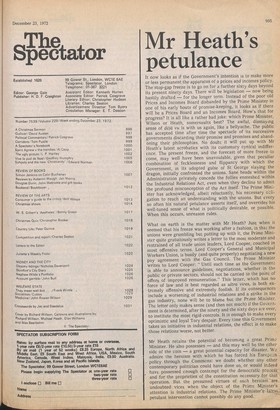Mr Heath's petulance
It now looks as if the Government's intention is to make more or less permanent the apparatus of a prices and incomes policy. The stop-gap freeze is to go on for a further sixty days beyond its present ninety days. There will be legislation — now being hastily drafted — for the longer term. Instead of the poor old Prices and Incomes Board disbanded by the Prime Minister in one of his early bouts of promise-keeping, it looks as if there will be a Prices Board and an Incomes Board. How's that for progress? It is all like a rather bad joke: which Prime Minister, Wilson or Heath, somersaults 'best? The awful, dismaying sense of déjà vu is with us again, like a bellyache. The public has accepted time after time the spectacle of its successive governments discarding 'their promise and promises and abandoning their philosophies. No doubt it will put up with Mr Heath's latest acrobatics with its customary cynical indifference. The present freeze, and the forecast of more freeze to come, may well 'have been unavoidable, given that peculiar combination of fecklessness and flippancy with which the Government, in its adopted guise of St George slaying the dragon, initially confronted the unions. Sane heads within the Administration privately concede the follies enmeshed 'within the Industrial Relations Act, even when they decline to admit !the profound misconception of the Act itself. The Prime Minister has acknowledged, albeit reluctantly, his necessary ongation to reach an understanding with the unions. But every so often his natural petulance asserts itself, and overrides his well-tuned sense of what is politically desirable, or possible. When this occurs, unreason rules.
What on earth is the matter with Mr Heath? Just when it seemed that his freeze was working after a fashion, in that the unions were grumbling but putting up with it, !the Prime Minister quite gratuitously writes a letter to the most moderate and restrained of all trade union leaders, Lord Cooper, couched in most 'offensive terms. Lord Cooper's General and Municipal Workers Union, is busily (and quite properly) negotiating a new pay agreement with the Gas Council. The Prime Minister writes to Lord Cooper: " Until such time as the Government is able to announce guidelines, negotiations, whether in the public or private sectors, should not be carried to the point of offers of improved remuneration." This letter, which has no force of law and is best regarded as ultra vires, is both extremely offensive and extremely foolish. If its consequences include a worsening of industrial relations and a strike in the gas industry, none will be to blame but the Prime Minister. The letter only makes sense (and then not much) if the Government is determined, after the ninety and the sixty days are over, • to institute the most rigid controls. It is enough to make every optimistic and loyal Tory despair. Every time this G Dvernment takes 'an initiative in industrial relations, the effect is to make those relations 'worse, not better.
Mr Heath retains the potential of becoming a great Primc Minister. He also possesses — and this 'may well be the other side of the coin — a great potential capacity for disaster. Wa admire the heroism with which he has forced his Europzan policy through the Commons: we doubt whether any other contemporary politician could have done so, or would indeed have possessed enough contempt for the democratic process_ and for the proprieties of the constitution necessary for that operation. But the presumed virtues of such heroism are undoubted vices when the object of the Prime Minister's attention is industrial relations. The Prime Minister's petulant intervention intervention cannot possibly do any good.










































 Previous page
Previous page